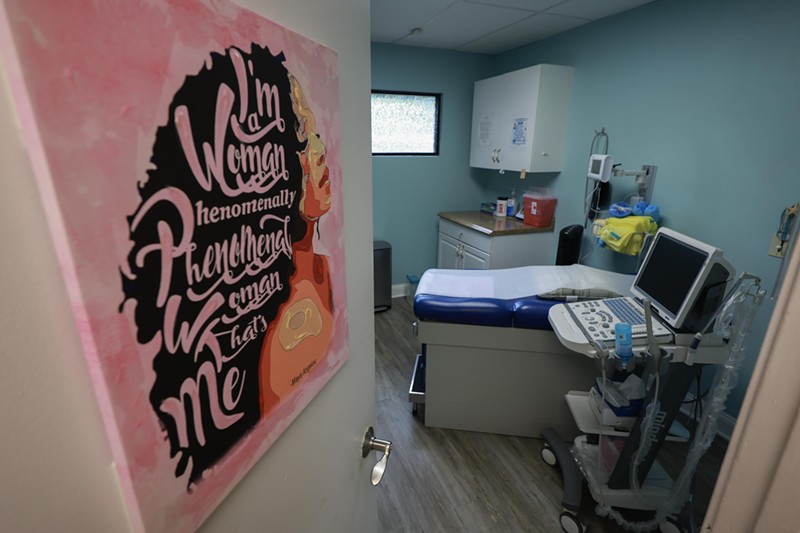Update published 5/2/2024: The Florida Agency for Health Care Administration issued an emergency rule clarifying that the treatment of certain life-threatening pregnancy-related medical conditions will not be considered "abortions" under Florida's new regulations.
The rule states that if a pregnant patient's water breaks early (known as a premature rupture of membranes), a doctor is permitted to induce labor regardless of how far into the pregnancy the mother is. If the unborn baby does not survive delivery, the procedure "does not constitute an abortion," the agency says.
The rule allows doctors to terminate ectopic pregnancies, a dangerous condition where a fertilized egg attaches to the fallopian tube or other surface outside a woman's uterus. Treatment of trophoblastic tumors, which involve tumor formation from placental cells, is also expressly permitted under the rule.
Florida State Rep. Anna Eskamani, a Democrat from Orlando, said the rule offers some clarity on emergency care for pregnant women but that "healthcare should never be politicized like this."
"Desantis is picking & choosing which life-saving care he supports and which he doesn't by deeming some care 'not an abortion' even when procedure is the same," Eskamani said in a statement released on her social media.
The Agency for Health Care Administration published the rule a day after Florida's new abortion law went into effect. The agency cited a "deeply dishonest scare campaign and disinformation being perpetuated by the media, the Biden Administration, and advocacy groups to misrepresent the Heartbeat Protection Act and the State’s efforts to protect life, moms, and families."
The original story follows below.
Florida's new abortion law went into effect Wednesday, putting in place restrictions comparable to those in Georgia and South Carolina and making North Carolina the nearest state to permit abortions beyond the first six weeks of gestation.
The six-week abortion ban in Florida replaces the state's previous 15-week ban that was in effect following the overturning of Roe v. Wade in June 2022. It includes exceptions for patients whose lives are endangered by their pregnancy and for victims of rape, incest, or human trafficking, although a woman must provide a copy of a restraining order, police report, medical record, court order, or other documentation.
Under the newly implemented law, those who perform or "actively participate" in the termination of a pregnancy after six weeks gestation can be charged with a third-degree felony.
Floridians will have a chance to void the ban in November when they're set to vote on an abortion-rights ballot initiative in the general election. If passed by a 60 percent supermajority, the measure will cement abortion rights into the Florida Constitution.
The six-week abortion ban, which was passed by the state legislature and then signed into law in April 2023 by Gov. Ron DeSantis, was on hold pending a Florida Supreme Court decision last month. The state's highest court upheld the state's 15-week ban challenged by Planned Parenthood, the Center for Reproductive Rights, and the American Civil Liberties Union (ACLU) of Florida on behalf of several abortion providers across the state. The conservative-leaning court found in the April 1 decision that the state constitution's right of privacy does not apply to abortion, paving the way for the more restrictive six-week ban to take effect.
That same day, the Florida Supreme Court ruled that the ballot initiative to protect abortion rights met the requirements to be included on the 2024 general election ballot. The initiative, known as Amendment 4, would establish a broad-sweeping right to undergo an abortion before fetal viability, which is estimated to be around 24 weeks gestation. The measure also includes exceptions to that cutoff point if a patient's health is in danger.
Healthcare providers and abortion rights advocates say the new restrictions will make it difficult, if not impossible, for some women to get an abortion, considering many are not aware they are pregnant six weeks into pregnancy.
"The women of Florida are in trouble," Chelsea Daniels said in a statement on behalf of the Yes on 4 ballot-initiative campaign, "Today, we awoke to a new world, a world where the State, and not individuals, is in control of our bodies, our lives and our futures — a world where treatable complications in pregnancies will become life-threatening, not because we don't know how to treat them, but because we won't be allowed."
Daniels added women will have to travel to abortion clinics out of state even in instances where an abortion is medically necessary, putting more patients in danger and further straining a limited supply of clinics and abortion networks in the southern U.S.
"In Texas, one woman who miscarried lost liters of blood and had to go on a breathing machine before doctors were legally able to intervene and help her," she added. "And in Louisiana, we've seen the OB/GYN shortage that anti-abortion bans have caused for the entire state."
While the new Florida law includes exceptions for women impregnated as a result of rape, incest, or human trafficking, it requires victims seeking an abortion to undergo the procedure within 15 weeks of gestation.
"We are proud to support life and family in the state of Florida," said Gov. DeSantis upon passing the bill. "I applaud the Legislature for passing the Heartbeat Protection Act that expands pro-life protections and provides additional resources for young mothers and families."
With the implementation of Florida's restrictions, every state in the Deep South is enforcing laws that generally prohibit abortions outright or tightly restrict abortions early in pregnancy. Texas, Louisiana, Mississippi, and Alabama have total or near-total bans while South Carolina and Georgia prohibit abortions after the detection of a fetal heartbeat, which typically occurs around five to six weeks of gestation.
North Carolina permits abortions during the first 12 weeks of pregnancy, though there is a 72-hour waiting period.
Abortion clinics in Florida were inundated with patients in the weeks leading up to the implementation of the new law, some of whom were unaware it was going into effect. Clinics have been providing patients seeking abortions with information on options in North Carolina and New England states.
Polls show broad support for abortion rights in Florida, though it's unclear whether backing is sufficient to meet the supermajority needed to pass the November ballot measure.
A 716-person survey by the University of North Florida in the fall of 2023 found that 62 percent of respondents said they would vote yes on the measure. Of 2,020 Florida respondents in a Pew Research Center poll, about 56 percent said they believed abortion should be legal in "most cases."
[
{
"name": "Air - MediumRectangle - Inline Content - Mobile Display Size",
"component": "19274298",
"insertPoint": "2",
"requiredCountToDisplay": "2",
"watchElement": ".fdn-content-body",
"astAdList": [
{
"adType": "rectangle",
"displayTargets": "mobile"
}
]
},{
"name": "Editor Picks",
"component": "17482312",
"insertPoint": "4",
"requiredCountToDisplay": "1",
"watchElement": ".fdn-content-body",
"astAdList": [
{
"adType": "rectangle",
"displayTargets": "desktop|tablet"
},{
"adType": "rectangle",
"displayTargets": "desktop|tablet|mobile"
}
]
},{
"name": "Inline Links",
"component": "18711090",
"insertPoint": "8th",
"startingPoint": 8,
"requiredCountToDisplay": "7",
"maxInsertions": 25
},{
"name": "Air - MediumRectangle - Combo - Inline Content",
"component": "17482310",
"insertPoint": "8th",
"startingPoint": 8,
"requiredCountToDisplay": "7",
"maxInsertions": 25,
"watchElement": ".fdn-content-body",
"astAdList": [
{
"adType": "rectangle",
"displayTargets": "desktop|tablet"
},{
"adType": "rectangle",
"displayTargets": "desktop|tablet|mobile"
}
]
},{
"name": "Inline Links",
"component": "18711090",
"insertPoint": "8th",
"startingPoint": 12,
"requiredCountToDisplay": "11",
"maxInsertions": 25
},{
"name": "Air - Leaderboard Tower - Combo - Inline Content",
"component": "17482313",
"insertPoint": "8th",
"startingPoint": 12,
"requiredCountToDisplay": "12",
"maxInsertions": 25,
"watchElement": ".fdn-content-body",
"astAdList": [
{
"adType": "leaderboardInlineContent",
"displayTargets": "desktop|tablet"
},{
"adType": "tower",
"displayTargets": "mobile"
}
]
}
]












